Ever since I wrote the original Life Lessons Learned from Labyrinth article, I couldn’t stop thinking of more! There are few things I love more than Labyrinth, Sarah Williams, and that pesky Goblin King, Jareth. And Hoggle. And Sir Didymus and Ludo. The Bog of Eternal Stench can just stay the heck away. And… okay, stop. Focus. Without further ado, I give you seven more important life lessons learned from Labyrinth!
Logic 101: Reasoning with Doors
Let’s suppose that you’re on a quest, just walking along, trying to get to the castle beyond the Goblin City, and you encounter some doors with faces for knockers. These guys are totally into logic; they’re all like, “One of us always lies and the other one always tells the truth. If you pick the wrong door, you’re screwed. Good luck, and may whatever god(s) you serve have mercy on your soul.”
Personally, I would give them my best deer-in-headlights expression and possibly start crying. I hate making snap decisions about important things. Not so much with Sarah Williams. She figures it out. She asks one of them which door the other one would say leads out, knowing that they would both indicate the same door – the one that doesn’t lead out. If this sounds as non-obvious to you as it does to me, you should check out the Knights and Knaves puzzles by Richard Smullyan, which is where the idea for the door puzzle in Labyrinth came from. Sarah picks up on this pretty quickly; so quickly, in fact, that I actually searched images of her bedroom to see if Smullyan’s book was in any of the shots of Sarah’s bedroom. So far, I can’t find it. If you find it, let me know! That’s just exactly the type of thing that might be hidden in this movie!
We come across “knights” and “knaves” in our daily lives, and while they may not always lie or always tell the truth, the sentiment is applicable. We won’t always be able to tell a knight from a knave, and we can’t control others, but what we can control is our own response. Like Sarah, we can figure out how to use both the truths and the lies that others tell us in order to take an active role in deciding our own fate. She didn’t know them well, she couldn’t trust them not to lie, but she did know herself, and worked out a way to get through their BS on her own. It actually sounds like navigating some workplaces, if you think about it. Sarah’s brain may be buzzing with activity and intelligence, but once again, she didn’t count on the fact that the Labyrinth is not a fair place when her “success” leads her to a long, dark, vertical tunnel populated with… some hands. Yeesh.
Helping Hands: Up or Down, Cake or Death, and Other Unreasonable Snap Decisions
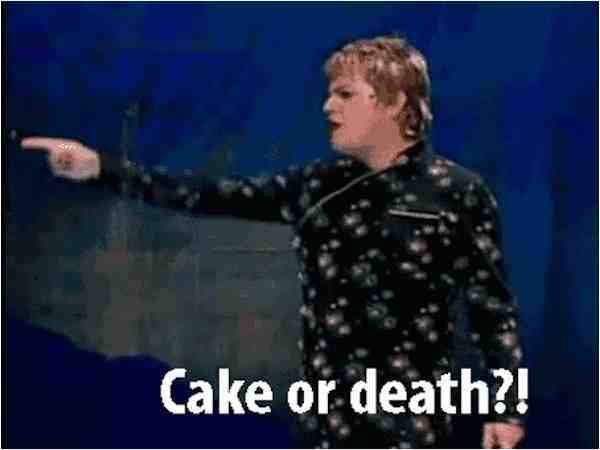
Thank you for flying Church of England …. Cake or Death?
The Helping Hands is one of the creepier moments in Labyrinth. They’re disembodied hands whose only job is to push a person up or pass a person downward, and they form mouths and faces out of… more hands. Pretty sure they’re made of fingers and foul sorcery, like Ash’s evil hand from the Evil Dead movies. Ugh. The hands catch Sarah as she seems to be falling, possibly to her death, and they demand that she make a decision on the spot: up or down. She goes with the natural flow of gravity and chooses down, but not until after she puts the handsy bastards in their place. She informs the hands that they are hurting her, not helping, only to be told that if they let go… down she goes.
The choice of this or that, this one or the other, makes me think of a comedy sketch by the Executive Transvestite Himself, (his own words for himself) Eddie Izzard, where he is expounding on how the Inquisition would never have worked with the Church of England because no one feels strongly enough about it to have much of an opinion. Instead of conversion-or-death, Izzard maintains it might have been more like choices of entree on an airplane, “Thank you for flying Church of England, cake or death?” Obviously, everyone chooses the cake. Sarah doesn’t get a “cake” option. She’s kind of stuck with “…or death?” If you haven’t seen Eddie Izzard’s Cake or Death routine, get thee to YouTube. It’s hilarious. The whole thing is great (but he does swear quite a lot, if that bothers you, but it’s generally at Nazis and other perpetrators of genocide. And the occasional squirrel.)
The Helping Hands are an interesting metaphor for learning to accept help and growing as a person. We don’t always get help when we need it, and sometimes the help we get isn’t nicely packaged. Sometimes we want gentleness and get tough love. Sometimes we want bread, but get oatmeal. What’s important is what we do with the help that is offered is up to us. Like Sarah, we often have to choose up or down, cake or death. And, like Eddie Izzard’s character in the Cake or Death sketch, when we run of of cake and are left with “Or Death,” – we ask for the chicken. And it actually works.
Biting Fairies: Beautiful Things Are Not Always As They Seem and Your Expectations May be Part of the Problem
When Sarah first meets Hoggle, he is basically Hoggle the Fairy Exterminator and Unapologetic Outdoor Pisser. It kind of makes me wonder what’s in that bottle of Anti-Fairy Spray. Ew. Sarah rushes to aid a fairy that has just been sprayed and picks the creature up, telling Hoggle that he is horrible for harming the fairy. The fairy then bites Sarah’s hand. It literally bit the hand that was helping it. While she was helping. Thanks, you flappy little jerk. While Sarah is indignant about the unfairness of being bitten, Hoggle shrugs it off. What did she expect? That’s what fairies are good for – biting and making nuisances of themselves.
This is a weird dichotomy of views. Hoggle’s solution to the fairy problem is to zap them. Sarah’s is to extend help and then be surprised and angry when the fairies (accustomed to bad treatment) aren’t sweet and gracious. In this instance, both of them are wrong. You should help people because you want to, not because you expect gratitude in return. You shouldn’t assume that all fairies are bad and try to stamp them out, nor should you assume that because they’re beautiful that they’re also nice. There are a lot of lessons in this section alone. Don’t judge a book by its cover, don’t commit fairy genocide, don’t assume that beauty is equal to goodness… yeah, there’s a volume of fairytales and fables all rolled up into that one scene!
If a Roving Gang of Heads-Optional Muppets Invite You to “Chilly Down,” Try to Keep your Head. (Sorry/not sorry.)
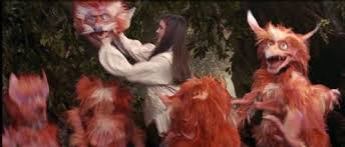
Don’t lose your head. No, really.
When Sarah encounters the Fireys, a colony of party animals that live to “chilly down,” they try to coerce her to come and party with them… and then try to casually remove her head. Yikes.
The Fireys have trouble taking no for an answer, but Sarah does not cave to the pressure. She clearly has a bad feeling about this situation – it doesn’t seem entirely safe and comfortable to her, and she refuses to be a part of this scene. This is one of the best, most important lessons embedded in Labyrinth: you don’t need a reason to remove yourself from situation you’re not comfortable with. You just need to say no, and get yourself to safety however you can. Sarah’s resourcefulness allows her to actually take one of the Fireys’ heads and toss it into the mix like a beachball, causing enough confusion among the squabbling partybeasts to allow her to get away for long enough to grab onto the rope Hoggle throws her. The metaphor is strong with this one. He throws her a literal, actual rope, and she climbs it to (relative) safety.
If you find yourself at a party where people are trying to get you to do things you’re not into, say no. Get out. And, if attacked, fight your way out if necessary. Actual human attackers may not have removable beach ball heads, but the idea remains. You do not need to stay in a place where you aren’t safe, and if a friend throws you a rope (a reason to leave, a ride home, the comfort of support, etc.) take it!
It Could be Worse – You Could be That Old Guy’s Hat!
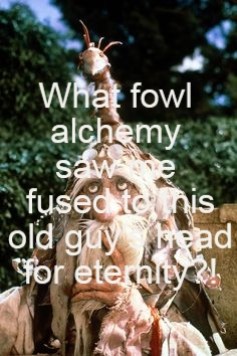
Were Ed and Al involved in these shenanigans?
Wisepersons are not always actually wise. Sometimes, we seek the help of a guru, religious figure, parent, grandparent, role model, etc., only to find out that they’re just people, like us. People with problems, people with biases and prejudices and often far less knowledge than we might think. People whose past wizardly endeavors just might have caused a bird to be fused to the top of their hat. I’m not sure I trust this old guy to get Sarah to the Castle Beyond the Goblin City if he’s going around with a hat like a sentient version of Neville Longbottom’s grandmother’s.
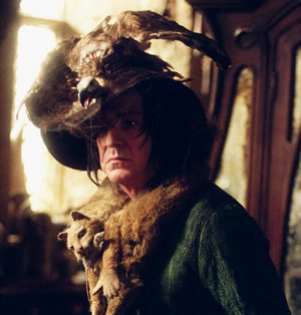
Professor Boggart Snape, at your service!
Just Because It Isn’t an Apple Doesn’t Mean that Fruit Won’t Knock You Out
Betrayals don’t come from utter strangers. They come from those we trust, or that we believe we can trust. Snow White took pity on an old woman, and accepted the poisoned apple. She never expected that someone she helped, an elderly woman, might be her evil stepmother in disguise, trying to kill her. Mufasa and Scar might have had their issues, but Mufasa clearly never thought that his own brother would engineer his demise. When Hoggle offers to Sarah the peach Jareth gave him, she has no reason not to trust him. Not only has he helped her many times, but she also considers him a true friend. He may not have known exactly what that peach would do, but he knew it wasn’t anything good, or he wouldn’t have waited so long and have been threatened so seriously before caving to fear and giving her the peach.
No one expects their brother to throw them into a stampede to be crushed to death. No one expects a little old lady to be an evil witch in disguise (at least… back then they didn’t because it wasn’t a trope yet… but I digress), or a trusted friend to purposefully cause you harm. You might expect a known axe murderer to be a threat. You might not be surprised when you give a stranger money and find out they used it on something illicit. But it’s a friend’s betrayal that always hurts the most because of the broken trust – the knowledge that something out there is greater than your affection for each other. In Hoggle’s case, it was fear. At that time in his life, he feared Jareth more than he loved Sarah, and it was making this mistake that provided him with a turning point in dealing with his cowardice. He saw what he had done and how far his fear drove him away from what he knew to be right and made a decision to help when the decision was put to him again to risk his own safety or live with his cowardice.
It’s All Junk – Don’t Become Overly Attached to your Hoard (Unless you’re Scrooge McDuck or The Mighty Smaug)
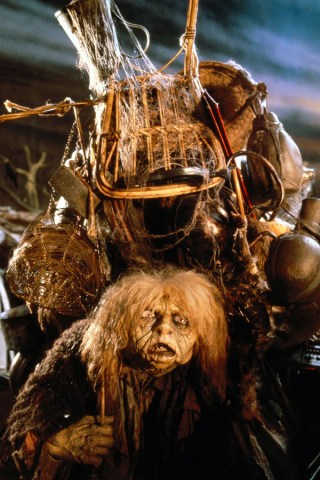
Don’t let it own you.
There is nothing wrong with a bit of nostalgia. Okay, even a lot of nostalgia. I love Sarah’s room, and my own is kind of modeled after it in some ways. The lesson to be learned from the Junk Lady, however, is not that we should get rid of all of our worldly possessions and throw out our entire childhoods. Instead, the Junk Lady shows us a literal representation of what happens to us figuratively when we place too much value on things at the expense of people. The Junk Lady was physically warped from carrying around all of her worldly possessions – she was stooped under their weight. When we allow our things to own us, and when we care more for them than we do for the people in our lives, we are emotionally burdened and crippled. Sarah was incensed at the beginning of the movie about her parents allowing Toby to snuggle Lancelot; but by the end, she willingly gave Lancelot into Toby’s care. She had learned that she had been allowing her things to mean more to her than what they were – just things.
You Have No Power Over Me.
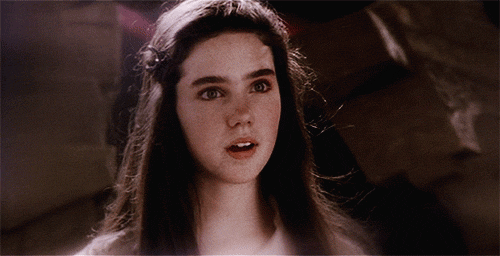
Oh yeah. THAT line!
It’s only six words. She memorized the whole book, but could never remember those six words. Why?
Possibly because it’s often really hard when outside forces place pressure on us to remember our own autonomy; and that, even though it’s hard, we are in charge of our own minds, and have the right to step up and say the words. We say the words with our voices and with our actions. Whenever I feel crushed under obligations and deadlines and everything seems too hard and too crazy, I sometimes think about this line. I can stop. I can quit things that are too much. I can say no when I want to say no. I can say yes when I want to say yes, even when under pressure to refuse. I can stand up to those who would try to tell me how I have to be, and I can say the words by being true to myself and remembering that I’m the one in charge of my own destiny, even when it doesn’t feel that way.
Sarah Williams stood up to the King of the Goblins, who had taken her brother at her own request. Jareth was, in his own way, in love with Sarah. He told her that all she had to do was “let him rule her” and he would “be her slave.” As romantic and exciting as that can sound, it was a direct threat to her autonomy and to her sense of right and wrong. Ruling others is wrong. Slavery is wrong. Changing your mind is your right. Yes, she asked Jareth to take Toby; but she changed her mind, thought better of it, and sought to make it right. So, when Sarah says, “You have no power over me,” there is so much more buried in that simple statement. It’s a sudden realization that, even if she were tempted to take Jareth’s offer, what she would be giving up was far more valuable.
Now, I don’t have a heart of stone, and I do have a pretty big soft spot for David Bowie with the mother of all power mullets. If someday, when Sarah is older (fanfic and manga-verse allowing), she decides to be with Jareth, it should be her own decision, made without coercion, and he will have to have learned to respect himself enough not to be her slave, and respect her enough not to ask her to be ruled. Not that I’d read that fanfic or anything.
But I totally would.
Do you have any life lessons from Labyrinth you’d like to share? Let me know in the comments!
Sara Goodwin has a B.A. in Classical Civilization and an M.A. in Library Science from Indiana University. Once she went on an archaeological dig and found awesome ancient stuff. Sara enjoys a smorgasbord of pan-nerd entertainment such as Renaissance faires, anime conventions, steampunk, and science fiction and fantasy conventions. In her free time, she writes things like fairy tale haiku, fantasy novels, and terrible poetry about being stalked by one-eyed opossums. In her other spare time, she sells nerdware as With a Grain of Salt Designs, Tweets, and Tumbls.
(Top image: original illustration by Emilie Majarian for The Mary Sue)
Are you following The Mary Sue on Twitter, Facebook, Tumblr, Pinterest, & Google +?



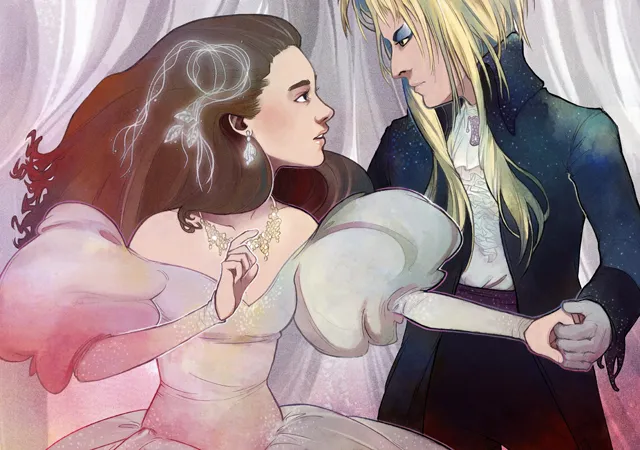





Published: Nov 18, 2014 08:00 pm